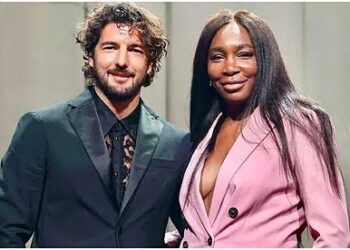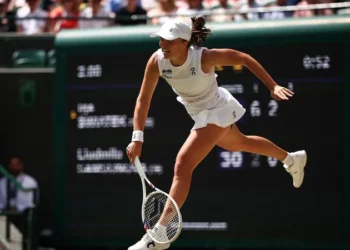When most people think of the world’s wealthiest tennis players, the usual names spring to mind — Roger Federer with his billion-dollar endorsements, Serena Williams and her successful business ventures, or Novak Djokovic and Rafael Nadal, who have both amassed hundreds of millions in prize money and sponsorships. But there’s another name making headlines at Wimbledon this year — not for their serve or forehand alone, but for the jaw-dropping size of their fortune: Jessica Pegula.
Jessica Pegula, the American tennis star, has long been an underrated force on the WTA Tour, quietly climbing the rankings with her consistent performances and fierce competitive spirit. But off the court, Pegula’s name is synonymous with staggering wealth — wealth so vast that UK tabloids have recently quipped she’s “wealthy enough to buy Manchester United.”
The source of this enormous fortune isn’t prize money or sports endorsements alone. Pegula is the daughter of Terry and Kim Pegula, the billionaire owners of the NFL’s Buffalo Bills and the NHL’s Buffalo Sabres. Terry Pegula, an oil and gas magnate, has an estimated net worth of around $6.7 billion according to Forbes. Jessica, as an heiress to this empire, is often referred to as the “world’s richest tennis player” — a moniker that has followed her throughout her career.
At Wimbledon 2025, Pegula’s wealth has once again become a talking point, with many fans joking that she could easily purchase one of the Premier League’s most storied clubs — Manchester United — whose estimated valuation sits around $6 billion. While the idea is mostly playful speculation, it does put into perspective just how unusual her background is in a sport where even the biggest stars often come from modest beginnings.
Despite her privileged upbringing, Pegula has won respect from fans and fellow players for forging her own path in tennis. She turned professional in 2009 but really made her mark later in her career, battling injuries and setbacks before establishing herself as a mainstay in the world’s top 10. Her gritty performances at Grand Slams and her reputation as one of the tour’s hardest workers have helped shift the narrative from her wealth to her tennis talent.
Off the court, Pegula is also an entrepreneur. She launched her skincare line, Ready 24, and has invested in various business ventures, demonstrating that she’s not content to simply rely on her family’s billions. She has also spoken candidly about the privilege and responsibility of her background, using her platform to support animal welfare causes and community initiatives in Buffalo.
The buzz around her “buying Manchester United” also highlights the current climate in football, where billionaire takeovers and private equity deals dominate the headlines. United, a club with global appeal but years of ownership controversies, continues to attract takeover speculation. Pegula’s hypothetical ability to buy such a massive club is less about her actual intentions — she’s shown no sign of wanting to own a football team — and more about the striking reality that a Grand Slam quarterfinalist could, on paper, make such a purchase.
For now, Pegula’s focus remains firmly on the grass courts of SW19. She’s once again in the mix at Wimbledon, hoping to break through for her maiden Grand Slam title and prove that her story is about much more than dollars and family fortunes.
In a sport where rags-to-riches tales are the norm, Pegula is refreshingly different. She’s rewriting what wealth means in tennis — not as a golden ticket, but as a backdrop to an athlete’s relentless pursuit of excellence on her own terms. And while the jokes about buying Manchester United will continue to follow her, Pegula seems far more interested in lifting a Wimbledon trophy than a Premier League one.
In the end, that may be the most powerful part of her story — reminding the tennis world that money can’t buy Grand Slams, but ha
rd work just might.











